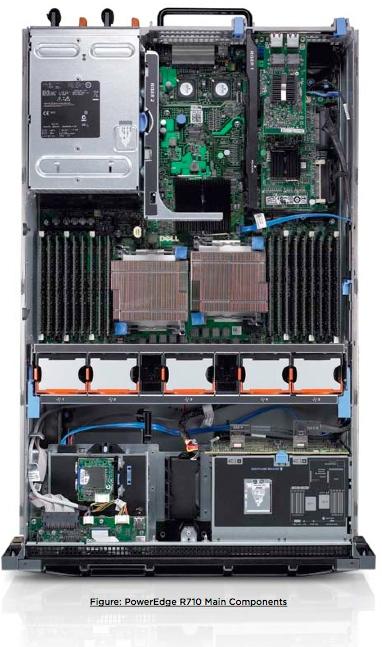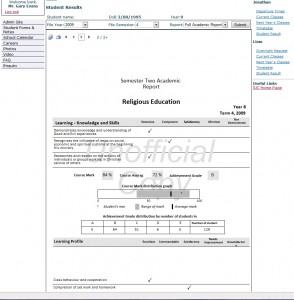Almost daily there are reports in our newspapers or any number of current affairs programs speaking about the dangers of living in an online world. Of note in the past month I have heard of companies insisting that potential employees “friend” them on Facebook that basically gives the company open access to whatever is being posted, to numerous employees being taken to task even dismissed for what they say on their Facebook pages. All warnings show that currently people do not know how to behave in online environments.
Even a simple thing such a passwords to protect your online self is something ignored by many. After having had several conversations with adults over the past several weeks, they are often just as naive than their teenage counterparts. The number of times I chat to students and adults alike and their password is “password” is amazing. Not that I am fishing for passwords as this is something we stress at the College that students should never divulges to anyone, but in fact all too often they are happy to share without any thought of the potential consequence. In fact many people are willing to share information online without any thought as to who has ownership of the material and what it is being used for and perhaps most importantly the effect that this free information sharing has on those around us.
At Joeys there are regular discussions in Year group meetings as well as several activities carried out throughout the year to guide students into how to behave and navigate in the online world, but in actual fact we need to ensure that the boys are getting educated in appropriate online behaviour continuously and form all areas of their lives. It is an obvious fact that teenage boys do feel they are invincible and what they know about behaving and protecting themselves online does not necessarily apply to them. I recently read an article that suggested that through formal and informal education we teach children from a very early age to cross the street, yet we literally allow our boys to cross the “internet superhighway” either in their bedrooms, on their phones without the full guidance on how to do this safely.
For many adults we just do not understand the need and desire for teenagers to be SO connected throughout their every day activity. Michael-Carr Greg, leading cyber psychologists suggests that online social media spaces such as FaceBook is the modern day equivalent of the local milkbar. One with older children knows that their lives are planned, shared and even lived in this online environment just as much are the “Real World”. I know the lack of planning of teenagers in organising events and the almost continuous barrage of texts that occur literally up to the minute of meeting in order to get things happening in the real world personally infuriates me. Yes infuriating to we older people but a natural and logical way of life for anyone in the under 25 age group. One asks why a simple phone call would not do.
But this is their online world, their milkbar, their way of staying connected. An Australian Government Office for Youth Report in 1999 stated that social networking sites give young people a sense of community. They are the modern day hangouts where they can maintain friendships, to build identity (explore what music they like, fashion, political views etc) and to help and support each other on personal issues. The report goes on to suggest, “Social Networking reinforces their current social lives and social relationships. “
Being connected is also very powerful tool as no longer do you leave you home, your school, your place of employment and no longer hear from people, it is possible to always stay in touch, even if your list grows to the many hundreds and in fact includes many you would not even say hello to on the street. Added to this is the need for many to let friends of friends or in fact even people totally unknown to them have access too much of their private life.
This is one of the first key lessons that we as educators and parents need to teach our children. Ideally if you can get your son to be friends with you online it is possible for you to guide them in their activities, but if nothing else it is important that you keep in touch and have discussions lines open so that you are fully aware if the friend list is getting out of hand. It is quite a status symbol for kids to get as many friends as possible. You need to ask them, how well they know their contacts and how much are they sharing. Because of course if their privacy settings are not set correctly, they are happily sharing everything not only with their many friends and loose acquaintances but also often knowingly or unknowingly sharing about themselves and their lives with the FRIENDS of friends (who also are in their hundreds). If you already start with a very wide friendship base, this expands to an almost limitless number of people who know intimate details about their online persona without them truly knowing or understanding how widespread this can be.
This can have tremendous implications for the way that the boys are perceived both now and in the future. Again Carr-Greg suggests “ teenagers were oblivious to the relentlessly public nature of the Internet and did not think twice about acting out their passions and making their mistakes online.” All what is said, images posted, locations reported through any their devices such as phones, ipads or tablets, as well as computers goes towards creating their digital footprint. The quick and fast rule we tell the boys is that they need to consider if they would share the image or comment with anyone to their face and / or does it pass the “grandma” test.
Teenagers like sharing their good times online so the latest party, football outing or even “smart or not so smart” comment about others. It is quickly there for all to see, and share with their friends. There is a very pertinent YouTube video titled Think before you Post, which truly highlights the permanent nature of what is put online, once something is posted it can never truly be taken down. Inappropriate posting can have serious implications both now and in the future. Teenagers are making their mistakes online, sharing comments that may be hurtful or said in fun but without the tone of voice, expression so that the meaning is not clear and others both in the present and in future have access to this anytime. I have already indicated that employers are getting potential employees to befriend them on Facebook but also there are many companies and institutions that make it common practice to search a person’s digital footprint before considering them for employment or scholarships. Roger Clarke, chairman of the Australian Privacy Foundation “Reclaiming your online identity is like trying to unbake a cake. If potential employers have seen you drunk with your top off, you can’t undo it,”
The most common sense approach to combat any negative digital footprint is to ensure that privacy setting are closed so that only friends can see posts, but most importantly educating teenagers that just because there is a sense of anonymity to what they post nothing should be said or posted that they would not say or show to others to their face. Lack of thought in this area can not only lead to embarrassing situations down the track, but if posted at the expense of others can quickly turn into a bullying situation.
Bullying and cyber bullying is basically the same thing, but the nature of online social environments and the world of texting amplify the situations enormously. For those who are doing the bullying, a posted insensitive or cruel comment or text can easily be retransmitted over and over again, quickly expanding the situation to disastrous proportions. For those who are at the receiving end of the bullying, the attacks can be continuous and seemingly never ending. Although both forms of bullying are totally unacceptable, with traditional bullying methods, the victim can at least walk out of the environment and escape from time to time, With cyberbullying, it is somewhat different; the email or text messages, blog or FaceBook posts are widespread and never ending. As parents there are a number of things you can assist your teen in this area. In this area, prevention is of course better than trying to find a cure, so by protecting their online presence so that only true friends have access to personal data, photos and locations can minimize the risk of becoming a victim. Firstly if there is some evidence that your son is being cyber bullied it is essential that all communications are kept as evidence. Even if the bullying does not involve people in close proximity to your child, in the first instance the child’s schools should also be informed. The Kids Help line (details below) now offers assistance to teenagers both through phone, email and online counseling so this should also be something you should make your son aware of. Again open communication and discussing ground rules on the use of all technologies will also assist. Teenagers will often go to bed with their phones so that they can stay connected but in the event of difficult situations such as bullying and harassment this also means they do not get a break from the torments thus making it all that more difficult to cope with. Perhaps a policy that phones get put away from bedrooms after a certain hour may also alleviate any potential problem and if nothing else gives your teen much needed sleep. It is interesting to note that at a recent Cybersafety presentation, it was highlighted that many young people have more than one phone, often without full parental knowledge. Again make sure ALL phones are out of reach.
Protecting ones digital reputation and learning the etiquette and rules of appropriate behaviour are vital skills that are truly the responsibility of all involved. The bottom line is if you can keep communication with your child open so that you have access to their online world be that by establishing your own online friendship or just being that voice of conscience who is both literacy and virtually hanging over their shoulders will certainly go a long way to helping learn to survive and thrive in the online environment. The web is evolving and quickly becoming an integral par of all our lives with all its wonderful opportunities but also at times inherent dangers. It is truly essential that we discuss, explore its potential and possibilities with our children so that we hold their hands as they cross the virtual roads.
DWEER: 2009 Report – Communicating with Young People
Australian Communication and Media Authority (Australian Govt) http://www.acma.gov.au/WEB/STANDARD..PC/pc=PC_312485
Kids Helpline: http://www.kidshelp.com.au/


